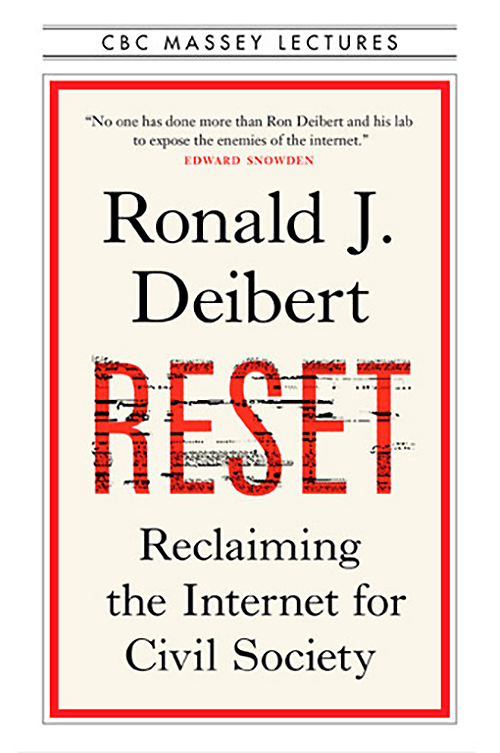Ronald Deibert’s Reset: Reclaiming the Internet for Civil Society has been shortlisted for the 2020 Donner Prize — an annual prize that recognizes the best public policy book of the year. The winner will be announced May 19.
Since its global adoption some 25 years ago, the internet has become an essential part of our daily lives: it’s hard to think of a human activity that doesn’t, in some way, involve it. By relieving us of time-consuming tasks, increasing productivity and helping us to connect with each other, it has inarguably made many aspects of our lives much easier than they were before.
Yet there is a dark side to the net, and few know that better than Ronald Deibert. Deibert is a professor at the Munk School of Global Affairs & Public Policy and in the Department of Political Science in the Faculty of Arts & Science. He also directs the Citizen Lab, an interdisciplinary research laboratory engaged in protecting human rights around the world from the threats posed by modern information and communication technologies.
Deibert is known for ferreting out cyber-espionage networks connected to corrupt political regimes; at the Citizen Lab, the internet is often a vehicle for unchecked evil. But in recent years, he’s noticed how that evil has seeped into every corner of the net — afflicting even the most comfortable, wherever they may live.

Reset paints a frightening picture of the way misinformation, toxic discourse and corporate surveillance are slowly poisoning us all. On a more optimistic note, it also suggests ways in which such harms might be mitigated.
In the internet, “you have all of this data floating around, an ecosystem that is insecure and easy to exploit, and a world full of malicious people,” Deibert says. “Add all that together and you’re going to have a horrible abuse of power. And innocent people will be drawn into that, as they have throughout history."
Reset is full of sobering anecdotes that show how vulnerable every internet user is to identity theft, manipulation through targeted advertising and even financial ruin. Deibert recounts a 2019 breach in Ecuador, for example, that exposed the intimate personal data of pretty much every citizen in the country. Elsewhere, he describes the phenomenon of human content moderators who monitor your so-called private messages, or listen to what you tell Alexa and Siri.
And on it goes — including a detour into how terrible the internet is for the environment. “I’ve always had a fascination with the physical infrastructure of technology,” says Deibert, citing his interest in such things as cell towers, undersea cables and rare earth mining. “It was apparent to me from very early on that wow, it takes a lot of energy to power this system.”
As the use of our devices has skyrocketed during the pandemic, so has environmental harm. “What we’re doing right now is drawing enormous energy. Although that might not be apparent, because you don’t smell it or see it the way you would diesel fuel, for example,” Deibert notes.
It would be impossible to abolish the internet at this point, and with all the value it adds, that would be a terrible idea anyway. So Deibert argues instead for restraint.
“I’ve done a lot of work studying political philosophy, and I consider myself to be liberal-minded,” he says. “Within liberal theory there’s a strong tradition of thinking about security and civic virtue. We are part of a collective and we need to behave in a certain way, to restrain our appetites and be respectful of other people.”
He suggests that such restraint be applied to governments seeking to control their constituents; to corporations using people as what he calls “livestock for data farms”; and to individuals flaming each other on Twitter or other platforms.
Education plays a large part here. When it comes to formal regulation of the cyberspace’s ownerless frontiers, however, he says we have to tread softly. “We’re living in a time where you can’t fail to notice that every country, it seems, has some kind of commission on social media regulation … the big risk right now is that there will be wrongheaded regulation, or regulation used as a disguise for something else,” he says. In some countries, “internet regulation” connotes censorship and spying — “so you have to be careful for what you wish for there.”
Twenty years after its inception, the Citizen Lab continues to demonstrate the value of restraining toxic behaviour in cyberspace. Motivated by civic virtue and not the bottom line, Deibert says institutions such as U of T are in a unique position to demonstrate how and why internet culture should be reconsidered. “The University,” he says, “is about cultivating a protected space for controversial opinions and scientific inquiry, no matter where it leads. Even if it upsets powerful interest groups.”
Shortlisted Donner Prize finalists receive an award which Ronald Deibert has donated to establish the Reset Scholarship in Social Media and Democracy, sponsored by the Department of Political Science and the Munk School. Donations to this scholarship will support a woman and/or BIPOC (Black, Indigenous and people of colour) student who successfully completes the POL106H course, Contemporary Challenges to Democracy: Democracy in the Social Media Age.

